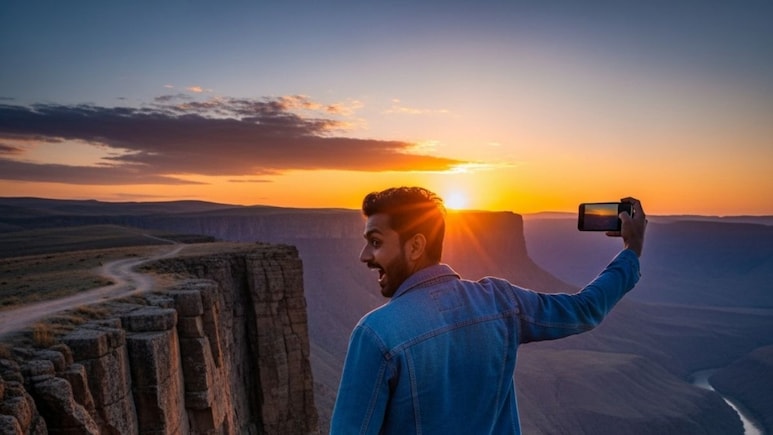
- India recorded 271 selfie-related casualties, including 214 deaths and 57 injuries
- The study covered selfie incidents causing harm or death from March 2014 to May 2025
- Falls from heights caused nearly 46% of all selfie-related fatalities globally
A new study might make you think twice before you grab your camera to take that Instagram-worthy selfie during a trip. With a startling 271 casualties-214 deaths and 57 injuries-India emerged as the deadliest country to take selfies, making up approximately 42.1 per cent of all instances reported worldwide, according to The New York Post.
The Barber Law Firm's analysis monitored deaths and injuries due to selfies from March 2014 to May 2025.
The study used articles from Google News that showed instances in which trying to take a selfie directly resulted in harm or death. Researchers identified a number of contributing factors, including a high concentration of people, easy access to dangerous locations like train tracks and cliffs, and a robust social media culture.
The United States came in second with 45 selfie-related losses, including eight injuries and 37 fatalities.
With 19 casualties, including 18 fatalities and one injury, Russia comes in third place. Pakistan was fourth with 16 deaths and no injuries, while Australia completed the top 5 with 13 selfie deaths and two injuries.
The top 10 list of most dangerous countries for selfie seekers includes, in addition to those already mentioned:
- India
- United States
- Russia
- Pakistan
- Australia
- Indonesia (14 casualties)
- Kenya, United Kingdom, Spain, and Brazil (each with 13 casualties)
The survey found that falls from rooftops, cliffs, or towering structures were responsible for almost 46 per cent of all selfie-related deaths, highlighting the lethal results of a single misstep in the quest for the ideal photo.
The report also highlights the tremendous pressure people face on social media to create "perfect" photos, which frequently takes precedence over fundamental safety measures.
"The perfect photo simply is not worth the danger," stated Kristopher Barber, founder and principal attorney of The Barber Law Firm. He also noted that many of these sad events might have been prevented by simply taking a "few steps back or finding a safer vantage point."
According to experts, people often prioritise their urge for viral content ahead of basic safety, taking needless and occasionally lethal risks. This has also happened far too often with tragic TikTok challenges.
Recently, an Indian tourist, who tried to take a picture with an elephant in Karnataka's Bandipur Tiger Reserve, was gravely hurt. Seeing the charging elephant, the man panicked, ran and fell on the road. The elephant pinned him down as the onlookers screamed to scare the animal away. Fortunately, the elephant backed off, and the man escaped.
Track Latest News Live on NDTV.com and get news updates from India and around the world

